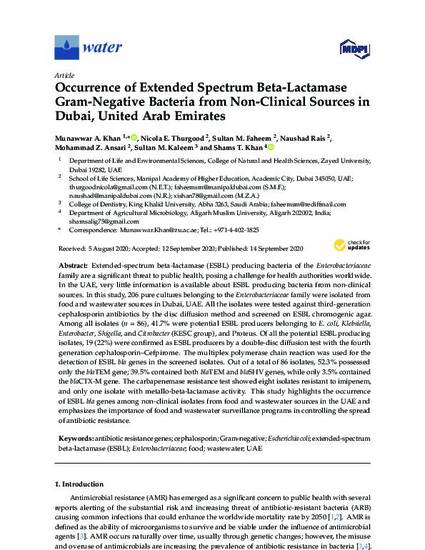
© 2020 by the authors. Extended-spectrum beta-lactamase (ESBL) producing bacteria of the Enterobacteriaceae family are a significant threat to public health, posing a challenge for health authorities worldwide. In the UAE, very little information is available about ESBL producing bacteria from non-clinical sources. In this study, 206 pure cultures belonging to the Enterobacteriaceae family were isolated from food and wastewater sources in Dubai, UAE. All the isolates were tested against third-generation cephalosporin antibiotics by the disc diffusion method and screened on ESBL chromogenic agar. Among all isolates (n = 86), 41.7% were potential ESBL producers belonging to E. coli, Klebsiella, Enterobacter, Shigella, and Citrobacter (KESC group), and Proteus. Of all the potential ESBL producing isolates, 19 (22%) were confirmed as ESBL producers by a double-disc diffusion test with the fourth generation cephalosporin-Cefpirome. The multiplex polymerase chain reaction was used for the detection of ESBL bla genes in the screened isolates. Out of a total of 86 isolates, 52.3% possessed only the blaTEM gene, 39.5% contained both blaTEM and blaSHV genes, while only 3.5% contained the blaCTX-M gene. The carbapenemase resistance test showed eight isolates resistant to imipenem, and only one isolate with metallo-beta-lactamase activity. This study highlights the occurrence of ESBL bla genes among non-clinical isolates from food and wastewater sources in the UAE and emphasizes the importance of food and wastewater surveillance programs in controlling the spread of antibiotic resistance.
- Antibiotic resistance genes,
- Cephalosporin,
- Enterobacteriaceae,
- Escherichia coli,
- Extended-spectrum beta-lactamase (ESBL),
- Food,
- Gram-negative,
- UAE,
- Wastewater
Available at: http://works.bepress.com/munawwar-khan/7/